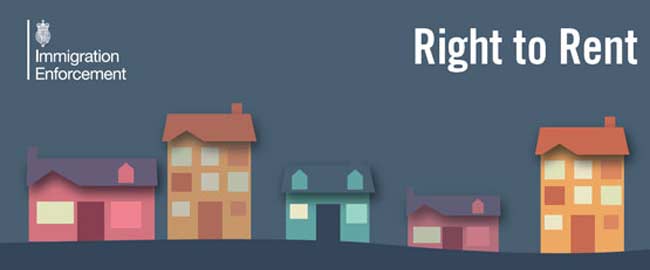
Another day, another incoming landlord legal requirement to ruin our lives, and add to the forever growing list. Sigh.
Welcome to the Immigration Act 2014, which specifically includes the right to rent” – legislation that requires all landlords in England to ensure their tenants have an immigration status that permits them to rent private accommodation.
Everything I cover in this post is a brief overview of the right to rent scheme, based on the official Government-issued Landlord’s Guide to Right to Rent Checks. I strongly encourage all landlords to read the guide for the most accurate, complete, and up-to-date information.
Page contents
- What is the “Immigration Act and right to rent”?
- Who is responsible for conducting the right to rent check?
- What are the landlord’s penalty for not complying with the right to rent check?
- How do landlords comply with right to rent checks?
- What documentation will (and will not) be accepted as proof of right to rent?
What is the “Immigration Act and right to rent”?
All landlords in England have a responsibility to prevent those without lawful immigration status from accessing the private rented sector. You do this by conducting right to rent checks on all prospective adult tenants before the start date of a tenancy agreement, to make sure the person is not disqualified from renting a property by reason of their immigration status.
In other words, all landlords (including those that sublet or lodger landlords) are required to check whether prospective tenants (that is, before entering into a tenancy agreement) have a lawful right to reside in the private rental sector.
In practice, compliance is relatively straightforward when the prospective tenant is a British or Irish citizen, as it typically involves checking and retaining a copy of their passport. However, things can become more complex when dealing with tenants who have time-limited immigration permission. In such cases, landlords must not only verify the tenant’s documents but may also be required to carry out follow-up checks to ensure the their right to rent is still valid once their initial permission expires (more on that shortly).
That said, the requirement has sparked controversy within the industry, with many questioning whether it should really be a landlord’s responsibility to verify a tenant’s immigration status. In short, many believe landlords should not be expected to help enforce immigration policy, which is essentially what this legislation asks us to do. It is what it is.
That being said, I don’t think the legislation is entirely unreasonable in principle, as it can help landlords carry out better referencing, particularly for those who, unwisely, don’t already ask for ID.
Who is responsible for conducting the right to rent check?
Responsibility under the Right to Rent Scheme lies with the landlord; that is the person who authorise the occupation of accommodation by the tenant under an agreement providing for the payment of rent.
However, there are certain circumstances in which this responsibility can be transferred to another party, such as a letting agent.
Landlords may appoint an agent to carry out right to rent checks on their behalf, but there must be a written agreement in place that clearly states:
- the agent is to be responsible for the initial right to rent check and whether or not the agent will be responsible for any follow-up checks for those with a time-limited right to rent.
- the agent must conduct the checks within the timescales laid out in this guidance and the code of practice on right to rent: civil penalty scheme for landlords and their agents
- liability for civil penalties transfers to the agent, but liability cannot be transferred beyond the agent.
What are the landlord’s penalty for not complying with the right to rent check?
The Immigration Act 2014 states that if found to be in breach, the person responsible for conducting the checks can face fines of up to £20,000. Ouch!
How do landlords comply with right to rent checks?
Under the right to rent Scheme, individuals generally fall into two main categories based on their immigration status:
- Those with an unlimited right to rent
- Those with a time-limited right to rent (meaning follow-up checks may be required routinely)
The majority of people will have an unlimited right to rent, while others may have a right that is subject to time restrictions.
Those with an unlimited right to rent
The following groups of people currently have an unlimited right to rent:
- British citizens
- Irish citizens
- individuals who have the right of abode in the UK
- individuals granted settlement
- individuals granted settled or pre-settled status under the EUSS
- individuals who have no time limit on their permission to stay in the UK
Checks on individuals with an unlimited right to rent can be carried out at any time before the start of the tenancy agreement. You must retain evidence of the check (for example, a photocopy of the passport), including the date it was conducted. This evidence must be kept for the duration of the tenancy and for at least one year afterward. No further checks are required.
Those with a time-limited right to rent
Those who do not have an unlimited right to rent may have a time-limited right to rent, meaning they have valid immigration permission to reside in the UK for a limited period. These individuals are legally permitted to rent and can provide documentary evidence (either physical or digital) to demonstrate their right to rent.
The following group of people have a time limited right to rent:
- Individuals with valid Permission to Enter or Stay for a time limited period, or time-limited permission under the points-based immigration system.
- Individuals with an outstanding application with the Home Office.
For those individuals who have been granted an eVisa, the Home Office online service Check a tenant’s right to rent in England: use their share code page will confirm whether you will need to conduct a follow-up check and, if so, the deadline for when the follow-up check is required.
In other words, landlords must carry out follow-up checks to ensure the tenant’s right to rent has been extended once their previous immigration permission expires.
What documentation will (and will not) be accepted as proof of right to rent?
It can vary depending on the nationality of the prospective tenant, so use this free online service on the Gov website to find out:
- which types of documents give someone the right to rent in the UK
- how to check someone’s documents
Government right to rent document checker service
Bottom line: don’t rent to anyone without the legal right to stay, or you could face serious consequences!
Landlord out xo
Disclaimer: I'm just a landlord blogger; I'm 100% not qualified to give legal or financial advice. I'm a doofus. Any information I share is my unqualified opinion, and should never be construed as professional legal or financial advice. You should definitely get advice from a qualified professional for any legal or financial matters. For more information, please read my full disclaimer.


 Landlord Products / Services
Landlord Products / Services





























This is actually a very good thing for landlords, if a tenant has to prove who he or she really is then that can be recorded on a tenant database and if they are bad tenants this information can be recorded there warning other landlords to "beware this person, you do NOT want to rent anything to him". We have this in South Africa in the shape of an organization called "tenant profile network or TPN". Google it to see how it works and while I do not work for them I have used their services for the past few years.
Want to be a bad tenant? Hope you are or know a good forger!